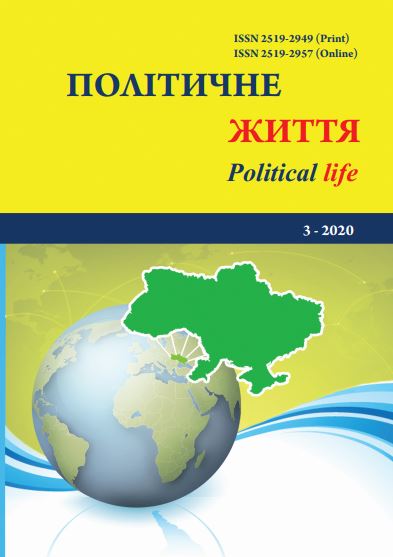US-Venezuela Relations at the Present Stage: the Geopolitical Aspect
DOI:
https://doi.org/10.31558/2519-2949.2020.3.12Keywords:
United States of America; Bolivarian Republic of Venezuela; Venezuelan crisis; geopoliticsAbstract
Relations with Venezuela play a significant role in the US policy towards Latin America. Venezuela is an important resource state and a promising sales market, therefore it attracts the attention not only of the United States, but also of other important geopolitical players such as the Russian Federation and the People’s Republic of China, which view the situation in Venezuela as an opportunity to challenge the United States and to advance their regional interests in Central and Eastern Europe and the South China Sea and Taiwan, respectively. Therefore, the crisis that has developed in Venezuela is acquiring geopolitical significance, because the state is becoming an area of confrontation between the leading powers.
The objective of the article is to study and analyze the geopolitical dimension of bilateral relations between the United States and Venezuela at the current phase and find out how these relations affect the geopolitical situation on the regional and global scale, as well as predict possible scenarios for their further development.
The article provides an analysis of the American-Venezuelan political and economic relations at the point and concludes that the United States have imposed a number of sanctions and restrictions that put significant pressure on the Venezuelan economy. Having studied the role and position of the United States in resolving the Venezuelan crisis, the authors have indicated that the US support J. Guaido and are working on a plan to resolve the political crisis. The study also identifies the role of third parties in relations between states, in particular the strategy of the Russian Federation regarding the Venezuelan crisis. Attention is also focused on the fact that the events in Venezuela caused the migration crisis – a significant geopolitical problem and requires the attention of not only the United States, but also the world community. Taking into account the geopolitical interests of the United States in Venezuela and concerns about the emergence of global geopolitical players in the state, the most favorable way for the United States would be to strengthen its role in the negotiation process to resolve the Venezuelan crisis, as well as join coordinated actions with the Lima Group.
References
Булавин В. И., Дабагян Э. С., Семенов В. Л. Венесуэла в поисках. Москва: ИЛА РАН. 2002. 216 с.
Иванов Н. С. Уго Чавес: штрихи идейно-политического портрета. Латиноамериканский исторический альманах. Т. 13. С. 212–230.
Коларов Г. Режим Уго Чавеса в Венесуэле: сочетание национальной демократии и левого радикализма? Политическая экспертиза: ПОЛИТЭКС. 2008. Т. 4. № 3. С. 14–28.
Дабагян Э. С. Внешняя политика Венесуэлы в начале ХХI века: основные направления. Вестник Московского университета. Сер. 25. Международные отношения и мировая политика. 2012. № 1. С. 95–123.
Angosto-Ferrandez L. F. Democracy, Revolution and Geopolitics in Latin America: Venezuela and the International Politics of Discontent. London: Routledge. 2015. 224 p.
Fukuyama F. Falling Behind: Explaining the Development Gap Between Latin America and the United States. Oxford: Oxford University Press. 2011. 328 p.
Langley L. D. America and the Americas: The United States in the Western Hemisphere. Athens: University of Georgia Press. 2010. 360 p.
Barshefsky C., Hill J T. U.S. – Latin America Relations: A New Direction for a New Reality. New York: Council on Foreign Relations Press. 2008. 85 p.
Dominguez J. I., de Castro R. F. Contemporary U.S.-Latin American Relations: Cooperation or Conflict in the 21st Century? London: Routledge. 2010. 272 p.
Prevost G., Campos C. O. The Bush Doctrine and Latin America. Palgrave Macmillan. New York. 2007. 261 p.
Corrales J. Romero С. A. U.S. – Venezuela Relations since the 1990s: Coping with Midlevel Security Threats. London: Routledge. 2012. 240 p.
Асауленко В. Відносини США із країнами Боліваріанського альянсу за президентства Барака Обами. Емінак. 2013. № 1-4. С. 33–39.
Чупрін Р. В., Ленда Ю. В. Венесуела в системі геополітичних відносин в Південній Америці на початку ХХІ ст. Наукові праці Чорноморського державного університету імені Петра Могили комплексу «Києво-Могилянська академія». Серія: Політологія. 2016. Т. 284, Вип. 272. С. 70–75.
Гаврилова Н. В., Кокуріна І. В. Зовнішньополітичний курс Венесуели за президентства Ніколаса Мадуро. Вісник Маріупольського державного університету. Серія: Історія. Політологія. 2015. Вип. 13-14. С. 222–229.
Bakke E. US – Venezuelan Relations. Harvard Model Congress. 2014. URL: https://www.addisonlibrary.org/ sites/default/files/House-Foregin-Affairs-US-Venezuela.pdf. (дата звернення: 10.07.2020).
Sullivan M. Venezuela: Issues for Congress, 2013-2016. Congressional Research Service. 2017. 55 p. URL: https://fas.org/sgp/crs/row/R43239.pdf. (дата звернення: 10.07.2020).
Szklarski B. Kryzys w Wenezueli z amerykańskiej perspektywy: między dryfem a rewolucyjnymi intencjami. Wenezuela na globalnej szachownicy. O co biją się swiatowe mocarstwa? / red. J. Gocłowska-Bolek. Warszawa: Ośrodek Analiz Politologicznych, Uniwersytet Warszawski, 2019. S. 50–68.
Gaouette N., Hansler J. Pompeo claims Russia stopped Maduro leaving Venezuela for Cuba. CNN. 2019. URL: https://edition.cnn.com/2019/04/30/politics/pompeo-maduro-russia/index.html. (дата звернення: 10.07.2020).
US TradeNumbers – Venezuela. WorldCity. URL: https://www.ustradenumbers.com/country/venezuela/. (дата звернення: 10.07.2020).
Губар О. Венесуела відкинула пропозицію США створити перехідний уряд. Deutsche Welle. 1.04.2020. URL: https://www.dw.com/uk/венесуела-відкинула-пропозицію-сша-створити-перехідний-уряд/a-52976293 (дата звернення: 10.07.2020).
Губар О. США пропонують 15 мільйонів доларів за допомогу в арешті Ніколаса Мадуро. Deutsche Welle. 26.03.2020. URL: https://www.dw.com/uk/сша-пропонують-15-мільйонів-доларів-за-допомогу-в-арештініколаса-мадуро/a-52931696 (дата звернення: 10.07.2020).
Gocłowska-Bolek J. Wenezuelski kryzys migracyjny. Wenezuela na globalnej szachownicy. O co biją się swiatowe mocarstwa? / red. J. Gocłowska-Bolek. Warszawa: Ośrodek Analiz Politologicznych, Uniwersytet Warszawski, 2019. S. 100–113.
Harris D. After Bolton: A Dual Track Approach to Venezuelan Foreign Policy. Georgetown Security Studies Review. 2019. URL: https://georgetownsecuritystudiesreview.org/2019/09/24/after-bolton-a-dual-track-approach-tovenezuelan-foreign-policy/#_edn12. (дата звернення: 12.07.2020).
Yapparova L. Geopolitical debts Why Russia is really sending military advisers and other specialists to Venezuela. Meduza. 2019. URL: https://meduza.io/en/feature/2019/07/29/geopolitical-debts. (дата звернення: 12.07.2020).
Вакарчук К. Загострення кризи у Венесуелі: внутрішня динаміка та зовнішні впливи. Борисфен Інтел. 2019. URL: http://bintel.com.ua/uk/article/zahostrennya_kryzy_v_venesueli/. (дата звернення: 12.07.2020).
Чи переростає криза у Венесуелі в опосередкований конфлікт між США та Росією? VOA. 2019. URL: https://ukrainian.voanews.com/a/is-venezuela-turning-into-a-proxy-conflict/4862306.html. (дата звернення: 12.07.2020).

